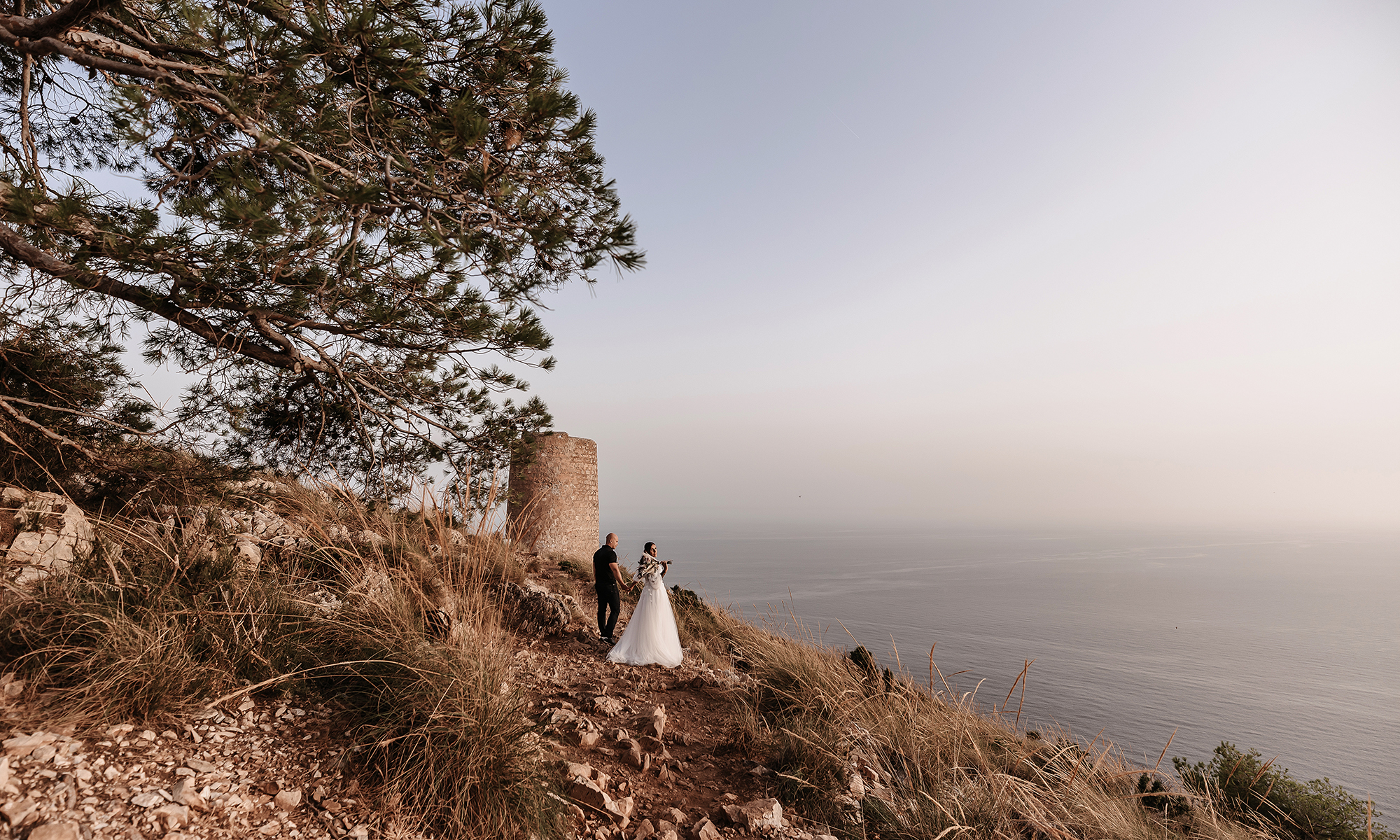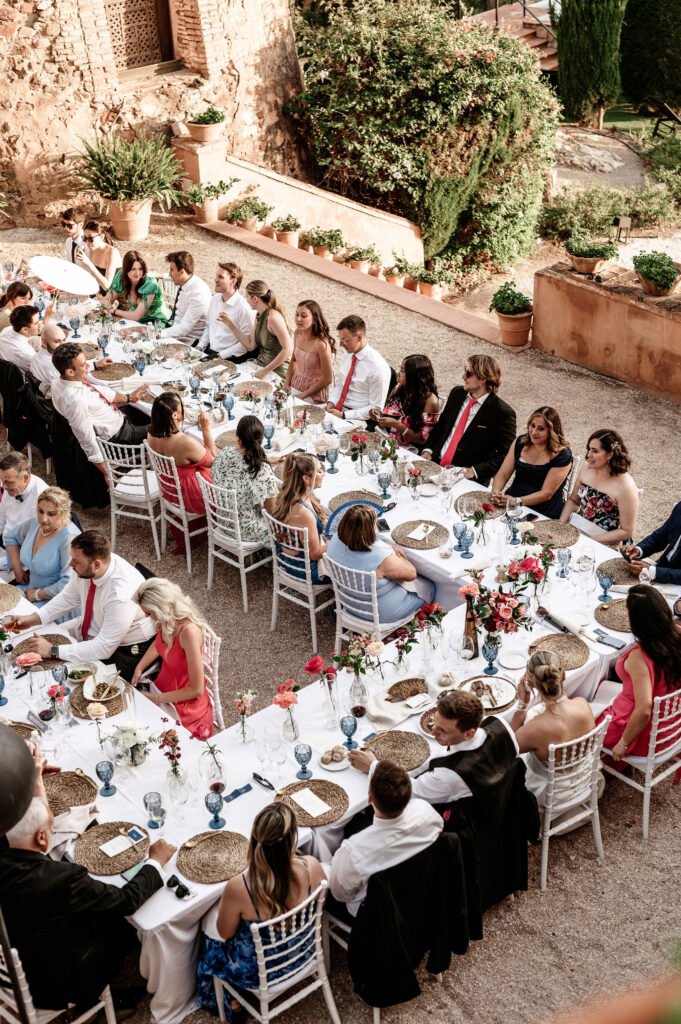Destination Weddings – A Comprehensive Planning Guide
A destination wedding, or a wedding abroad, is a wonderful way to celebrate your love in a special place, far from everyday life. It’s not just a ceremony, but an unforgettable journey during which you and your guests will experience new impressions, traditions, and cultures. A destination wedding can be organized anywhere in the world—from the Mediterranean coast to exotic islands, from historic European cities to breathtaking mountain panoramas.
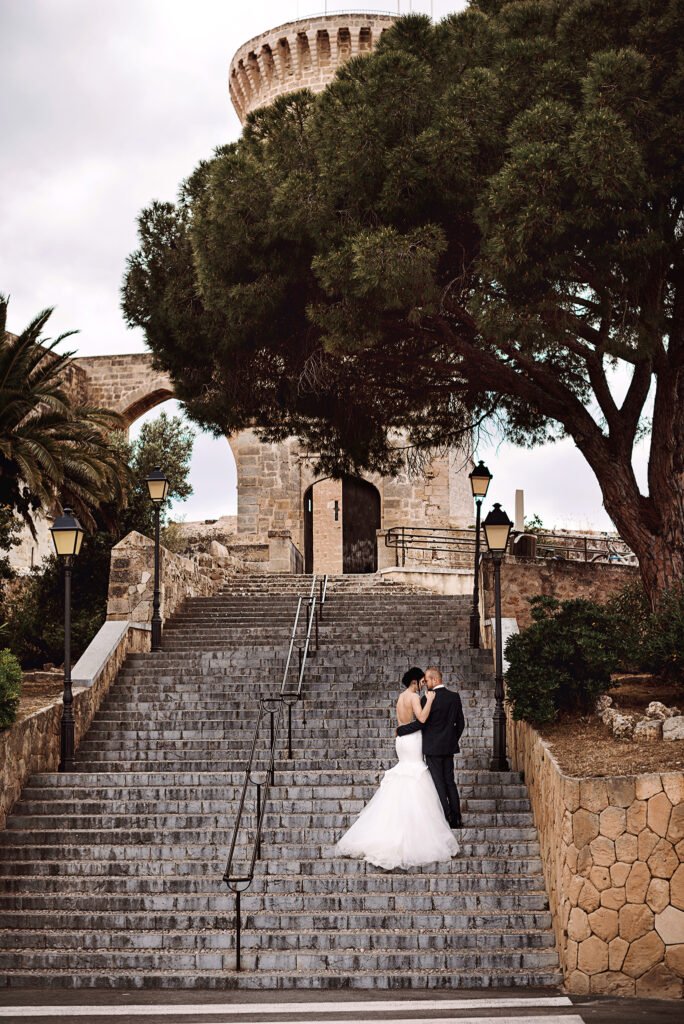
Planning a destination wedding requires careful preparation, but the result is worth it—your dream wedding in a stunning location, surrounded by your closest people. In this guide, we’ll cover all the key steps, from choosing the location to legal formalities and guest coordination, so that your wedding abroad becomes a flawless event.
What Is a Destination Wedding and Why Choose It?
A destination wedding is a wedding organized not in the couple’s place of residence, but in another city, country, or even continent. It can be a neighboring European city, an exotic island, or any other place that is special to you. It’s important to understand that a destination wedding doesn’t necessarily mean a wedding on another continent—it can also be a beautiful location within your own country, far from home.
Lithuanian couples are increasingly choosing to celebrate their weddings abroad for several reasons. First, it gives you the opportunity to combine the wedding with the honeymoon. Second, a destination wedding often costs less than a large traditional wedding in Lithuania, especially if the guest list is smaller. Third, it’s a great way to avoid the stress associated with organizing a big wedding and simply enjoy a more intimate, personal celebration.
Emotional and Cultural Benefits
Weddings abroad offer other advantages, too. They provide an opportunity to experience different cultures and traditions—and to incorporate them into your ceremony. It’s also a great chance to create unique memories that will last a lifetime. In addition, a smaller guest group creates a more intimate atmosphere and allows you to spend more quality time with your loved ones.
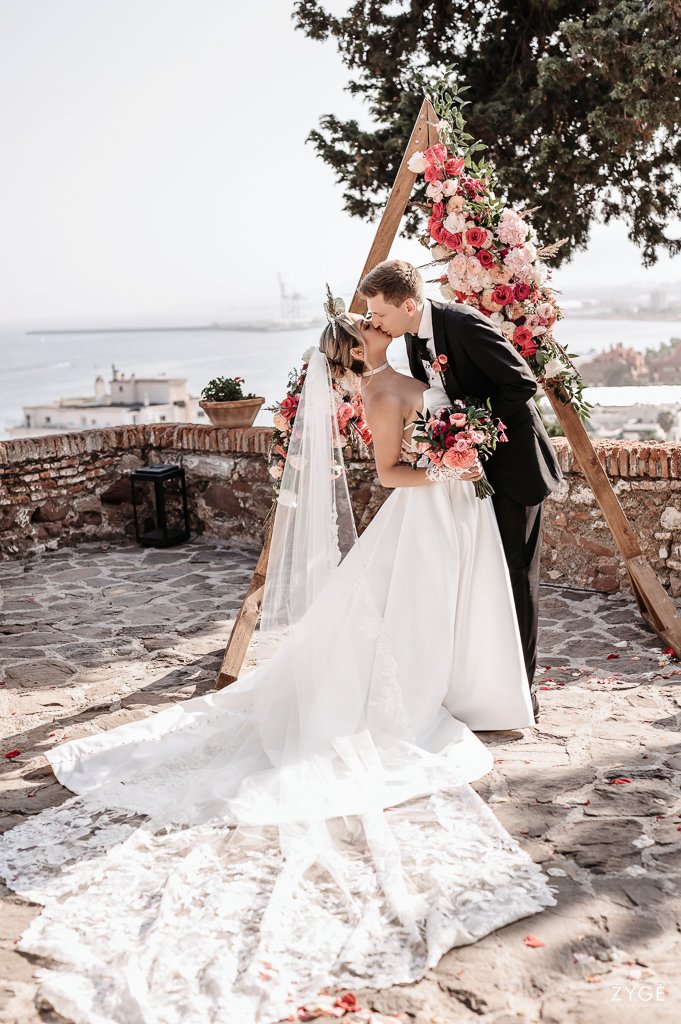
Many couples who choose a destination wedding find that their celebration becomes not just a one-day event, but a multi-day gathering with their closest people. It’s a wonderful way to create a truly unforgettable experience for everyone involved.
Timing Your Wedding Abroad – When and Where
When planning a destination wedding, pay special attention to seasonality and weather conditions. Different locations have different ideal times of year for weddings, so it’s important to do thorough research.
In the Mediterranean region, the ideal time is May–June and September–October, when the weather is pleasant and tourist crowds are smaller. In the Caribbean, the best time is January–April, when the risk of hurricanes is lower. Urban and rural settings also differ in their best seasons—spring and autumn often suit city weddings, while summer is great for countryside venues.
When choosing a date, also consider local events or holidays that may affect accommodation prices or availability. For example, avoid planning your wedding in popular tourist destinations during their peak season—prices will be higher and places will be crowded.
Popular Destination Wedding Locations Among Lithuanian Couples
Lithuanian couples are increasingly choosing various European locations for their weddings. Italy—especially Tuscany and the Amalfi Coast—is one of the most popular choices due to its stunning landscapes, excellent cuisine, and romantic atmosphere. Greek islands such as Santorini and Crete also rank highly for their beaches and impressive sunsets.
Spain—particularly the Balearic and Canary Islands—is popular among those seeking reliably good weather. Portugal, with the Algarve region and the vineyards around Porto, is also getting a lot of attention from Lithuanian couples. Among the less conventional but growing choices are Croatia, with its Adriatic coast and historic towns, and Montenegro, with breathtaking mountain-and-sea vistas.
More exotic options include Sri Lanka, Thailand, or Bali, though these require more planning due to distance and cultural differences. Cyprus is also growing in popularity among Lithuanians, as the planning process is relatively straightforward and the climate is pleasant for most of the year.
Budget and Costs: How Much Do Weddings Abroad Really Cost?
Although destination weddings are often thought to cost less than traditional ones, it’s important to understand all the associated expenses. Your budget includes not only core wedding costs but also travel, accommodation, and any additional events.
Core costs include the ceremony and reception venue, catering, beverages, décor, photographer, band or DJ, and a coordinator or planner.
On top of these, consider your travel costs—and potentially some vendors’ travel if they aren’t local. You should also factor in accommodation for yourselves and possibly for guests, if you choose to cover it.
Don’t forget additional events such as a welcome dinner or post-wedding brunch, which often accompany destination weddings. It’s also essential to budget for unforeseen expenses, such as extra baggage fees for a wedding dress or unexpected situations.
Roughly, a destination wedding in Europe can range from €10,000 to €30,000, depending on the guest count, location, and your preferences. In more exotic destinations, costs vary—some Asian countries may be cheaper, while certain islands can be more expensive due to logistics and limited resources.
Money-Saving Tips
There are several ways to reduce destination wedding costs. First, limit the guest count—this not only reduces expenses but also creates a more intimate atmosphere. Second, choose the shoulder or off-season when prices are lower. Third, use local vendors to avoid additional travel and transport costs.
Negotiate group discounts for accommodation and try to book early. Some resorts offer a complimentary ceremony package if you book a certain number of rooms. It’s also worth considering all-inclusive options, which can be more economical in the long run.
Be sure to sign clear contracts with all vendors, clarifying what’s included and avoiding unexpected fees. Wedding insurance is also an important investment to protect against unforeseen circumstances—especially when planning an event abroad.
Legal Aspects and Documentation
One of the most complex parts of planning a destination wedding is the legal requirements. Every country has different laws and requirements for foreign nationals registering a marriage, so it’s crucial to determine exactly which documents you’ll need.
In most countries, you’ll need passports, birth certificates, and certificates of no impediment. Sometimes documents must be translated into the local language and verified with an apostille. Some countries have residency requirements—i.e., you must be in the country for a certain period before the wedding.
Some couples choose to legally marry in Lithuania at the civil registry office before or after a symbolic ceremony abroad. This helps avoid complex legal procedures in another country but means you won’t have the official legal ceremony during your destination wedding.
Always contact the embassy or consulate of your chosen country in Lithuania to obtain the most up-to-date information on requirements. It’s also recommended to consult a local wedding planner who knows the local laws and can help with paperwork.
Note that in some countries, marriage registration for foreigners can take longer, so start the process at least 6–9 months before your intended date. Also consider that in some countries civil and religious ceremonies are separate processes, and you may need to complete both.
Choosing and Coordinating Vendors
Selecting vendors is one of the biggest challenges when planning a wedding abroad. If you don’t have personal recommendations, start with online research, read reviews, and look for portfolios that match your style.
A wedding planner’s role is especially important for destination weddings. A local planner knows the vendor market, speaks the local language, and can solve problems efficiently. If you decide to hire a planner, start by interviewing several candidates, discuss your vision and budget, and make sure your communication styles align.
When hiring a photographer, florist, musicians, and other vendors, it’s essential to clearly understand what’s included in their packages. For photographers, it helps to know whether they have worked at your venue before, as this improves their understanding of lighting conditions and the best photo locations.
If possible, arrange a short trip to your venue before the event to meet vendors in person. If that’s not possible, schedule video calls and ask for examples of previous work. Also request references from clients—especially those who also planned destination weddings.
Make sure you have clear contracts with all vendors, specifying services, prices, cancellation policies, and other terms. If you’re hiring vendors from Lithuania who will travel to your destination wedding, be sure to discuss travel and accommodation costs in advance.
Managing Guest Experience and Logistics
Guest experience is a key part of a successful destination wedding. Since your guests are investing their time and money to attend, it’s important to make their trip as smooth as possible.
Send out the date and location at least 8–12 months before the event so guests have time to plan. Save-the-date cards should include travel and accommodation information so guests can start budgeting.
Create a dedicated wedding website where guests can find everything they need: how to get there, accommodation options, local weather, recommended packing lists, and notes on local customs or etiquette. It’s also a great place to share the event schedule and answer frequently asked questions.
When organizing group travel, look for group discounts on flights and hotels. Many hotels offer special rates when you book a certain number of rooms. Consider group transportation from the airport to the hotel or venue to make things easier for your guests.
Be mindful of your guests’ needs—especially older guests or those with limited mobility. Ensure your chosen venue is accessible for everyone, or provide alternatives for those who may find certain activities challenging.
Welcome Bags and Local Activities
Prepare welcome bags for guests upon arrival. They can include useful items such as local snacks, bottled water, sunscreen, stomach-aid tablets, maps or local guides, and a personal note from you.
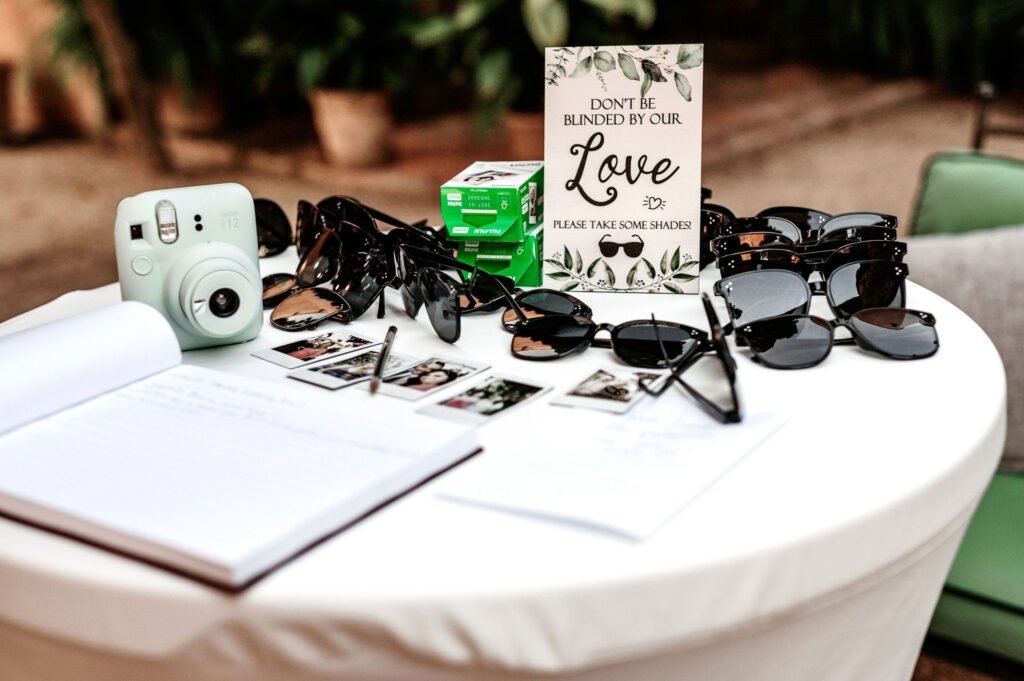
This is not only practical but also a sweet gesture that shows you value their presence.
Organize additional activities for guests before or after the wedding. These might be a local tour, a tasting dinner, a beach party, or any activity that reflects the local culture. Such activities help guests get to know the place better and create more opportunities to connect.
Elevating Your Event – Themes, Décor, and Local Touches
A destination wedding offers a unique opportunity to integrate local culture and traditions into your wedding design and atmosphere. This not only creates an authentic experience but also makes your wedding truly distinctive.
Consider incorporating local traditions into your ceremony or reception. For example, if you’re getting married in Italy, you could include traditional Italian wedding music or local dishes. If the wedding is in Greece, you might arrange a traditional dance lesson for guests or include Greek wedding rituals.
Décor can also reflect your chosen location. Use local plants and flowers—not only do they look beautiful, they’re also more economical since they don’t need to be imported. If your wedding is on a beach, incorporate ocean elements into the décor. If it’s in a vineyard, use grapes and vines as decorative touches.
The menu is another way to highlight local culture. Offer traditional local dishes or drinks, or create a fusion menu that combines Lithuanian and local flavors. This brings authenticity and lets guests try something new.
Practical Tips for Guests
- provide clear packing guidance based on the local climate and planned activities
- inform guests about the dress code in light of local conditions (for example, if the ceremony is on a beach, remind them that high heels may be unsuitable)
- share information about local customs or etiquette that may differ from Lithuanian norms
- recommend travel insurance and remind guests to check passport validity
- prepare an information pack on local transport options, restaurants, sights, and essential emergency phone numbers
Don’t forget to capture your destination wedding in unique ways. In addition to a traditional photographer, consider hiring a local videographer who can capture not only the wedding but also the atmosphere of the place. Polaroid cameras or a photo booth with local props can also be a fun guest activity that creates memorable keepsakes.
Finally, remember that the essence of a destination wedding is not only the ceremony but the shared experience. Give guests time to enjoy the location and each other’s company without overloading them with a tight schedule. Some of the best memories are often created in spontaneous moments.
Conclusion
Planning a destination wedding may seem complex, but with the right preparation and organization, your dream wedding abroad can become a reality. Start early, clarify all legal requirements, create a detailed budget, and—if needed—hire a professional planner to help coordinate the details.
Remember that the essence of a destination wedding is not just a perfect ceremony but an unforgettable experience for you and your guests. It’s a chance to create unique memories in a special place, surrounded by your nearest and dearest. Enjoy the planning process, and keep in mind that what matters most is your love and commitment to each other.
Whether you’re planning an intimate ceremony at a Santorini sunset, a luxurious celebration in a Tuscan villa, or a relaxed gathering on a tropical beach, a destination wedding gives you the opportunity to begin your married life exactly as you’ve always dreamed. Happy planning—and here’s to an unforgettable wedding abroad!
Frequently Asked Questions
When should we inform guests about a wedding abroad?
Send save-the-date notices 8–12 months before the wedding; formal invitations 9–6 months prior to the event. Early notice lets guests plan their trip.
Do we have to pay for guests’ accommodation and travel?
Typically, guests cover their own travel and accommodation, but provide recommendations at different price points and, if possible, secure group discounts.
What documents are required for a legal wedding abroad?
Passports, birth certificates, certificates of no impediment, possible translations/apostilles, and any additional documents required by the country’s laws.
Are weddings abroad cheaper?
Not always—while the guest list may be shorter, travel, accommodation, and planning costs can add up. Smart budgeting can help reduce expenses.
Do we need a wedding planner, or can we organize everything ourselves?
Some couples manage on their own, but hiring an experienced planner—ideally one who knows local conditions—saves a lot of stress and helps ensure nothing is overlooked.
Get to know my photography packages for weddings abroad:
